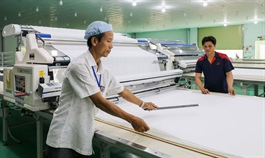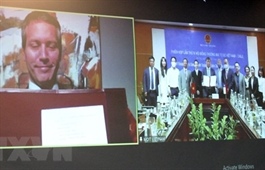Increase in Viet Nam – Belgium trade brings more opportunities for investors: Experts
Increase in Viet Nam – Belgium trade brings more opportunities for investors: Experts
The vietnam-briefing.com published by Dezan Shira & Associates – a consultancy firm on foreign investment in Asia – has run an article, emphasising that since the EU-Viet Nam Free Trade Agreement (EVFTA) took effect in August 2020, Belgium has played a significant role in promoting trade and foreign investment into Viet Nam. 
According to the article, major sectors that Belgian investors have particularly shown interest in are industrial zones, food and beverage, processing and manufacturing, pharmaceutical, and renewable energy.
It notes that with increasing trade and investment between Belgium and Viet Nam, Belgian investors have opportunities to invest in Vietnamese industries, favouring the economic and political landscape between the two countries.
Over the past decade, trade and investment relations between Viet Nam and Belgium have improved considerably. This has been attributed to Viet Nam’s growing economy and the expansion and globalisation of some Belgian corporations.
The article quotes Riccardo Benussi, Head of European Business Development of Dezan Shira & Associates, saying that more Belgian companies are looking to invest in Viet Nam, especially with the implementation of the EVFTA and subsequent reduced tariffs.
As of March 2021, Belgium has 78 investment projects in Viet Nam, with a total registered capital of US$1.1 billion, ranking 23rd among 131 countries and territories investing in Viet Nam.
Viet Nam is Belgium’s 14th largest trade partner, with a trade value reaching approximately $707.55 million in 2020, up 6.7 per cent compared to 2019.
In the first seven months of 2020, due to the COVID-19 pandemic, Viet Nam’s export value to Belgium totalled $1.4 billion, down 17.7 per cent year-on-year. Viet Nam imported $459 million worth of goods from Belgium, up 11.9 per cent year on year.
The article says these figures demonstrate that while Vietnamese exports to Belgium experienced a depression, Belgium’s exports to Viet Nam still grew, which is a positive signal for the future of bilateral trade between the two countries.
In 2019, within the EU, Belgium was the seventh-largest exporter to Viet Nam and the sixth largest in 2018. Belgium’s top exports to Viet Nam in 2020 were chemicals (46.2 per cent), and machinery and equipment (13.7 per cent). Meanwhile, Viet Nam’s top exports to Belgium were textiles, footwear and headgear, and base metals.
The most substantial Belgium investment in Viet Nam is the development and operation of an industrial park cluster known as the Deep C Industrial Zone (initially named the Dinh Vu Industrial Zone – DVIZ).
Geert Dom, Head of Marketing & Sales for DEEP C Europe and the US, said that DEEP C had attracted over 130 projects with foreign investors of different nationalities such as Belgium, Germany, Japan, the Republic of Korea, the US, and Singapore. Looking towards the future, DEEP C would still be attracting more Belgian and other investors to do business and establish factories and warehouses in this industrial zone.
Meanwhile, Filippo Bortoletti, Senior Manager for Dezan Shira’s Ha Noi Office, noted that apart from industrial zones, Belgian investors also played a significant role in the Vietnamese food and beverage (F&B) industry.
Belgium investments were focused on the supply chain of the industry, catering ingredients to restaurants, F&B factories, and retail, he said.
Viet Nam’s manufacturing and processing industry also proves to be a prospective investment sector for Belgium corporations. Over the years, most of the investments that Belgian investors have made in Viet Nam are in seaports, infrastructure, real estate, manufacturing, and power generation.
Pharmaceuticals is also a significant sector for foreign investment in Viet Nam. Most EU investors source raw pharmaceutical materials from the EU, ship them to Viet Nam, manufacture and process the products in Viet Nam before they re-export the products back to the EU.
Thanks to the EVFTA, about 71 per cent of import tariffs have been eliminated. Moreover, non-tariff barriers also brought opportunities in improving intellectual property rights and direct pharmaceutical imports. This means that Belgian investors can establish an entity to import pharmaceutical products and sell to local distributors or wholesalers. In addition, Belgian investors are also eligible to build warehouses and perform clinical research and trials, the article said.
The article also notes that Viet Nam is an attractive investment destination for green energy production projects, and it is predicted that many foreign investors, especially those from the EU, will continue to establish and expand their businesses in this sector in the country.
The increase in bilateral trade between Belgium and Viet Nam, as well as the increasing FDI from Belgium, demonstrate bright prospects for the two countries’ relations, it says, adding that the long-term presence and successful investment of Belgian companies in Viet Nam offer a good indication and reference for business opportunities in the country.

























